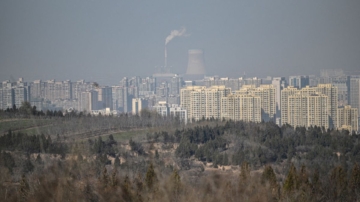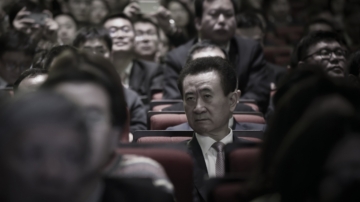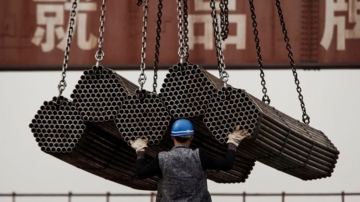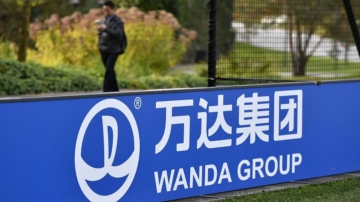【新唐人2013年10月07日讯】近年来,大陆房价不断高攀。随着房地产泡沫的日趋严重,大陆房地产企业的经营压力也越来越大。最近,一些房企公开发声,认为目前的土地供应政策造成“地王”不断出现,各地方政府从中获取了最大利益,老百姓沦为最终买单者,而房企本身处境也越发艰难。
多年来,大陆各地方政府片面追求GDP,热衷重复性建设,造成债台高筑,濒临破产的边缘。大陆审计署发布的审计公告表明,从1979年至今,土地出让收入,一直是中共地方政府主要的还债来源。而各级政府的最大财政收入,则来源于土地拍卖。
在10月3号结束的“2013兰州房地产业展示交易会”上,一些房地产企业呼吁大陆当局:改变目前的土地供应制度,取消土地拍卖。
今年以来,国内多个城市“地王”不断出现。继“中粮地产”以23亿6千万元,拿下北京朝阳区孙河西甸村地块,折合楼面价高达每平方米4万6千元,“新鸿基”以217亿7千万抢得上海徐家汇地段,成交楼面价达每平方米3万7千3百元。
北京天则经济研究所副所长 冯兴元:“房价的60%左右是属于政府拿走的部分,包括国有土地转让收入、税费,也就是说,老百姓花这么多钱买,实际上政府拿了一大块。”
面对大陆各地不断涌现的“地王”,房地产开发商们苦不堪言。他们认为:“地王”的出现只能导致一赢双损的结局,也就是,各地方政府通过拍卖拿到了超高的垄断利益,开发商利润变薄,购房者则要直接为房价上涨买单。
大陆房地产投资顾问郑先生:“现在的信号就证明:房地产商扛不住了。大的房地产商都是国企、央企,‘国进民退’嘛。民营的房地产商是苟延残喘。国企和央企如果经营不善的话,大家都知道最后买单的是谁。”
大陆房地产投资顾问郑先生分析,实际上,房地产商早就知道自己是在给政府打工,现在房企呼吁取消土地拍卖,有背后的深层因素。
郑先生:“房地产遭遇的风险,是中国很多行业面临着深层次经济危机的一个集中体现。”
但奇怪的是,虽然中国经济增长趋缓、面临硬着陆的危机,大陆各地房价却一直不断飙高,房地产过热的势头难以遏制。
大陆媒体报导,即使在兰州等二、三线城市,“地王”也不断涌现。 8月26号,福建“顺隆实业有限公司”以14亿多元的高价,拍到了兰州市高速公路天水路出口附近的地块。虽然当局号称在调控房价,但今年以来,兰州市房价一直上涨,丝毫看不出有回头的迹象。兰州一些主要的房地产项目,售价每平方米超过万元的楼盘比比皆是。
北京“天则经济研究所”副所长冯兴元分析,造成楼价上涨有多种因素,包括:当局对影响经济增长的不稳定因素进行掩盖,信息不透明,不断大量增发货币,政府对土地资源的垄断,国有房企不断充当“地王”角色,老百姓在其他方面基本没有投资空间等。
冯兴元表示,要改变这种局面,当局应该放开供给渠道。
冯兴元:“政府恰恰要退出。一个是政府至少不要成为唯一的土地出让方﹔第二,政府不应该以房地产公司的面目出现,来抬高土地价格。”
早前,大陆国土资源部公布的数据显示,上半年,全中国的土地出让合同价款,已高达1万7千亿元,增幅达77.3%,创历史新高。
采访/易如 编辑/李谦 后制/葛雷
Developers in China Want End to administrative land sales
In recent years, housing prices in China
have never stopped skyrocketing.
As the real estate bubble worsens, Chinese real estate
enterprises are feeling greater pressure
in keeping up their businesses.
Most recently, some of them stated publicly that
it is the current land supply system that is responsible for
the continuously record-breaking high land prices.
They argue that local governments get the most benefits
out of the process; while ordinary Chinese people have to
pay the huge bill and the situation for developers
is also turning worse.
Through all these years, the Chinese Communist Party’s
local governments have been one-sidedly pursuing GDP
growth via continuous construction.
Because of this, many of them are burdened with huge debts
and are on the verge of bankruptcy.
Reports from the CCP’s National Audit Office show that,
land transfer fees have always been the major income source
for local governments to pay off debts since 1979.
Most revenue for all levels of the CCP’s governments
also comes from land sales.
The “2013 Lanzhou Real Estate Trade Fair” just ended
on Oct. 3rd.
During the event, some real estate enterprises called on
the CCP authorities to reform the current land supply system,
such as by abolishing land sales by local governments.
This year, many Chinese cities have
kept seeing record-high land prices.
COFCO Property bought a residential site in Beijing's Xidian,
Chaoyang District, at 2.36 billion yuan ($384.6 million),
which equals to a unit price of 46,000 yuan ($7,500)
per square meter.
Sun Hung Kai Properties won an auction for a commercial
site in Shanghai’s Xujiahui District for a record total of
21.77 billion yuan ($3.5 billion), equaling a unit price of
37,300 yuan ($6,000) per square meter.
Feng Xingyuan, deputy director of Beijing Tianze
Institute of economics: “The governments have taken away
60% of the house prices via land transfer fees and taxes.
In other words, among the money that Chinese people
have to pay for buying a home, the majority drops into
pockets of the CCP’s government.”
As land prices continue to break records all over China,
developers are suffering more than ever.
They are saying skyrocketing land prices
can only benefit one side but harm all the others.
That is, local governments make extremely high profits by
monopolizing land auctions.
Meanwhile, developers are given less space to make profits
and customers have to pay for much higher house prices.
Mr. Zheng, real estate investment counselor: “This is
the message now: Private developers can no longer hold up.
The biggest developers are all state-owned ones, resulting
from the policy of ‘enriching the state prior to its people’.
Private developers are barely sustaining their businesses.
We all know that if state-owned enterprises are poorly
managed, someone will pay the bill for them.”
Mr. Zheng says that, in reality, developers had realized a long
time ago that they were simply working for the government.
Therefore there must be underlying reasons for them to
start calling for abolishment of administrative land sales.
Mr. Zheng: “The crisis faced by the real estate industry is
indeed a reflection of similar economic troubles that
have been bothering China’s many other industries.”
What is strange is that despite the slowdown of
economic growth and the economic hard landing crisis,
China’s house prices continue to surge everywhere.
It seems that the real estate overheat cannot be stopped.
Chinese media reported that, even land prices in second-
or third-tier cities, such as Lanzhou, are also at record highs.
On Aug. 26th, Fujian’s Shunlong Real Estate Co. won an
auction for a site close to the Tianshui Road exit of
Lanzhou Highway for over 1.4 billion yuan ($228.7 million).
Although the local authorities claimed that they were making
administrative adjustments, Lanzhou’s house prices have
always been increasing all year long
and there is no sign of a stop to this trend.
Unit prices of over 10,000 yuan ($1,600) per square meter
have become quite common among the city’s
major real estate projects.
Feng Xingyuan says there are many factors
leading to the increase of house prices.
Feng says those factors include the authorities' covering up
negative impacts on economic growth, a lack of transparency,
excessive money printing, the government's monopolizing
land resources, state-owned house developers' continuously
buying up the majority of the land,
the people having little space to invest, and so on.
Feng says that to change the current situation,
the CCP authorities should open more sources of land supply.
Feng Xingyuan: “The government should exit the process.
First, it should not be the only source of land transfer.
Second, it should be not use the form of real estate
enterprises to raise land prices.”
According to statistics previously released by the CCP’s
Ministry of Land and Resources, China's total land transfer
contract value in the first half of 2013 reached a historic high
of 1.7 trillion yuan ($212.5 billion), increasing by 77.3%.
多年来,大陆各地方政府片面追求GDP,热衷重复性建设,造成债台高筑,濒临破产的边缘。大陆审计署发布的审计公告表明,从1979年至今,土地出让收入,一直是中共地方政府主要的还债来源。而各级政府的最大财政收入,则来源于土地拍卖。
在10月3号结束的“2013兰州房地产业展示交易会”上,一些房地产企业呼吁大陆当局:改变目前的土地供应制度,取消土地拍卖。
今年以来,国内多个城市“地王”不断出现。继“中粮地产”以23亿6千万元,拿下北京朝阳区孙河西甸村地块,折合楼面价高达每平方米4万6千元,“新鸿基”以217亿7千万抢得上海徐家汇地段,成交楼面价达每平方米3万7千3百元。
北京天则经济研究所副所长 冯兴元:“房价的60%左右是属于政府拿走的部分,包括国有土地转让收入、税费,也就是说,老百姓花这么多钱买,实际上政府拿了一大块。”
面对大陆各地不断涌现的“地王”,房地产开发商们苦不堪言。他们认为:“地王”的出现只能导致一赢双损的结局,也就是,各地方政府通过拍卖拿到了超高的垄断利益,开发商利润变薄,购房者则要直接为房价上涨买单。
大陆房地产投资顾问郑先生:“现在的信号就证明:房地产商扛不住了。大的房地产商都是国企、央企,‘国进民退’嘛。民营的房地产商是苟延残喘。国企和央企如果经营不善的话,大家都知道最后买单的是谁。”
大陆房地产投资顾问郑先生分析,实际上,房地产商早就知道自己是在给政府打工,现在房企呼吁取消土地拍卖,有背后的深层因素。
郑先生:“房地产遭遇的风险,是中国很多行业面临着深层次经济危机的一个集中体现。”
但奇怪的是,虽然中国经济增长趋缓、面临硬着陆的危机,大陆各地房价却一直不断飙高,房地产过热的势头难以遏制。
大陆媒体报导,即使在兰州等二、三线城市,“地王”也不断涌现。 8月26号,福建“顺隆实业有限公司”以14亿多元的高价,拍到了兰州市高速公路天水路出口附近的地块。虽然当局号称在调控房价,但今年以来,兰州市房价一直上涨,丝毫看不出有回头的迹象。兰州一些主要的房地产项目,售价每平方米超过万元的楼盘比比皆是。
北京“天则经济研究所”副所长冯兴元分析,造成楼价上涨有多种因素,包括:当局对影响经济增长的不稳定因素进行掩盖,信息不透明,不断大量增发货币,政府对土地资源的垄断,国有房企不断充当“地王”角色,老百姓在其他方面基本没有投资空间等。
冯兴元表示,要改变这种局面,当局应该放开供给渠道。
冯兴元:“政府恰恰要退出。一个是政府至少不要成为唯一的土地出让方﹔第二,政府不应该以房地产公司的面目出现,来抬高土地价格。”
早前,大陆国土资源部公布的数据显示,上半年,全中国的土地出让合同价款,已高达1万7千亿元,增幅达77.3%,创历史新高。
采访/易如 编辑/李谦 后制/葛雷
Developers in China Want End to administrative land sales
In recent years, housing prices in China
have never stopped skyrocketing.
As the real estate bubble worsens, Chinese real estate
enterprises are feeling greater pressure
in keeping up their businesses.
Most recently, some of them stated publicly that
it is the current land supply system that is responsible for
the continuously record-breaking high land prices.
They argue that local governments get the most benefits
out of the process; while ordinary Chinese people have to
pay the huge bill and the situation for developers
is also turning worse.
Through all these years, the Chinese Communist Party’s
local governments have been one-sidedly pursuing GDP
growth via continuous construction.
Because of this, many of them are burdened with huge debts
and are on the verge of bankruptcy.
Reports from the CCP’s National Audit Office show that,
land transfer fees have always been the major income source
for local governments to pay off debts since 1979.
Most revenue for all levels of the CCP’s governments
also comes from land sales.
The “2013 Lanzhou Real Estate Trade Fair” just ended
on Oct. 3rd.
During the event, some real estate enterprises called on
the CCP authorities to reform the current land supply system,
such as by abolishing land sales by local governments.
This year, many Chinese cities have
kept seeing record-high land prices.
COFCO Property bought a residential site in Beijing's Xidian,
Chaoyang District, at 2.36 billion yuan ($384.6 million),
which equals to a unit price of 46,000 yuan ($7,500)
per square meter.
Sun Hung Kai Properties won an auction for a commercial
site in Shanghai’s Xujiahui District for a record total of
21.77 billion yuan ($3.5 billion), equaling a unit price of
37,300 yuan ($6,000) per square meter.
Feng Xingyuan, deputy director of Beijing Tianze
Institute of economics: “The governments have taken away
60% of the house prices via land transfer fees and taxes.
In other words, among the money that Chinese people
have to pay for buying a home, the majority drops into
pockets of the CCP’s government.”
As land prices continue to break records all over China,
developers are suffering more than ever.
They are saying skyrocketing land prices
can only benefit one side but harm all the others.
That is, local governments make extremely high profits by
monopolizing land auctions.
Meanwhile, developers are given less space to make profits
and customers have to pay for much higher house prices.
Mr. Zheng, real estate investment counselor: “This is
the message now: Private developers can no longer hold up.
The biggest developers are all state-owned ones, resulting
from the policy of ‘enriching the state prior to its people’.
Private developers are barely sustaining their businesses.
We all know that if state-owned enterprises are poorly
managed, someone will pay the bill for them.”
Mr. Zheng says that, in reality, developers had realized a long
time ago that they were simply working for the government.
Therefore there must be underlying reasons for them to
start calling for abolishment of administrative land sales.
Mr. Zheng: “The crisis faced by the real estate industry is
indeed a reflection of similar economic troubles that
have been bothering China’s many other industries.”
What is strange is that despite the slowdown of
economic growth and the economic hard landing crisis,
China’s house prices continue to surge everywhere.
It seems that the real estate overheat cannot be stopped.
Chinese media reported that, even land prices in second-
or third-tier cities, such as Lanzhou, are also at record highs.
On Aug. 26th, Fujian’s Shunlong Real Estate Co. won an
auction for a site close to the Tianshui Road exit of
Lanzhou Highway for over 1.4 billion yuan ($228.7 million).
Although the local authorities claimed that they were making
administrative adjustments, Lanzhou’s house prices have
always been increasing all year long
and there is no sign of a stop to this trend.
Unit prices of over 10,000 yuan ($1,600) per square meter
have become quite common among the city’s
major real estate projects.
Feng Xingyuan says there are many factors
leading to the increase of house prices.
Feng says those factors include the authorities' covering up
negative impacts on economic growth, a lack of transparency,
excessive money printing, the government's monopolizing
land resources, state-owned house developers' continuously
buying up the majority of the land,
the people having little space to invest, and so on.
Feng says that to change the current situation,
the CCP authorities should open more sources of land supply.
Feng Xingyuan: “The government should exit the process.
First, it should not be the only source of land transfer.
Second, it should be not use the form of real estate
enterprises to raise land prices.”
According to statistics previously released by the CCP’s
Ministry of Land and Resources, China's total land transfer
contract value in the first half of 2013 reached a historic high
of 1.7 trillion yuan ($212.5 billion), increasing by 77.3%.








